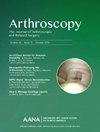Preoperative Depression Negatively Impacts Pain and Functionality Outcomes After Anterior Cruciate Ligament Reconstruction: A Systematic Review
IF 4.4
1区 医学
Q1 ORTHOPEDICS
Arthroscopy-The Journal of Arthroscopic and Related Surgery
Pub Date : 2024-10-01
DOI:10.1016/j.arthro.2024.01.030
引用次数: 0
Abstract
Purpose
To systematically investigate the influence of preoperative depression diagnosis and symptom severity on outcomes after anterior cruciate ligament reconstruction (ACLR).
Methods
A literature search was performed using the PubMed, Scopus, and Embase databases according to the 2020 PRISMA (Preferred Reporting Items for Systematic Reviews and Meta-analyses) guidelines. Studies evaluating the impact of depression on clinical outcomes after ACLR were included. Clinical outcomes, changes in depression, and complications were aggregated.
Results
Nine studies comprising 308,531 patients (mean age, 28.1 years; age range, 14-50 years) were included. The depression incidence ranged from 3.8% to 42%. Seven studies showed postoperative improvement in depression scores, with 5 reporting statistical significance. Assessment of depression exhibited substantial variability, with Patient-Reported Outcomes Measurement Information System (PROMIS) scores being the most common method. Patients with depression, despite showing greater improvements in scores, experienced significantly higher PROMIS Pain Interference scores preoperatively (range, 59.1-65.7 vs 56.8-59.2) and postoperatively (range, 46.3-52.3 vs 46.3-47.4) than patients without depression. They also showed significantly lower preoperative (range, 33-38.1 vs 39.7-41.5) and postoperative (range, 51.6-56.7 vs 56.7-57.6) PROMIS Physical Function scores, regardless of greater score improvement. Patients affected by depression had significantly higher rates of minimal clinically important difference achievement for the PROMIS Physical Function score (71%-100% vs 80%) and similar rates for the PROMIS Pain Interference score (71%-81% vs 68%) compared with patients without depression in 3 studies. Depression was associated with reduced adherence to rehabilitation protocols and increased postoperative complications, including infection, graft failure, arthrofibrosis, and readmission.
Conclusions
ACLR yields favorable outcomes for patients with and without preoperative depression. Individuals with preoperative depression may report inferior outcomes in terms of pain and functionality; nevertheless, despite these challenges, they exhibit significant improvements across all outcome measures after surgery, including reductions in depression levels.
Level of Evidence
Level IV, systematic review of Level II to IV studies.
术前抑郁会对前交叉韧带重建术后的疼痛和功能结果产生负面影响:系统回顾
目的 系统研究术前抑郁症诊断和症状严重程度对前交叉韧带重建术后疗效的影响。方法 根据 2020 年系统综述和元分析首选报告项目指南,使用 PubMed、Scopus 和 EMBASE 数据库进行文献检索。纳入了评估抑郁对前交叉韧带重建后临床结果影响的研究。结果共纳入九项研究,包括 308531 名患者(平均年龄 28.1 岁;年龄范围 14-50 岁)。抑郁症发生率为 3.8%-42%。与非抑郁症患者相比,抑郁症患者术前(范围为 59.1-65.7 vs 56.8-59.2)和术后(范围为 46.3-52.3 vs 46.3-47.4)的 PROMIS 疼痛干扰(PROMIS-PI)评分显著较高,尽管评分有较大改善。他们的术前(范围:33-38.1 vs 39.7-41.5)和术后(范围:51.6-56.7 vs 56.7-57.6)PROMIS-PF(PROMIS-Physical Function)评分也明显低于非抑郁症患者,无论评分改善程度如何。在三项研究中,与非抑郁症患者相比,抑郁症患者的PROMIS-PF(71%-100% vs 80%)最小临床重要差异(MCID)达标率明显更高,PROMIS-PI(71%-81% vs 68%)达标率相似。抑郁与康复方案的依从性降低和术后并发症(包括感染、移植物失败、关节纤维化和再入院)增加有关。术前患有抑郁症的患者可能会在疼痛和功能方面表现较差;然而,尽管存在这些挑战,他们在术后的所有结果指标上都有显著改善,包括抑郁水平的降低。
本文章由计算机程序翻译,如有差异,请以英文原文为准。
求助全文
约1分钟内获得全文
求助全文
来源期刊
CiteScore
9.30
自引率
17.00%
发文量
555
审稿时长
58 days
期刊介绍:
Nowhere is minimally invasive surgery explained better than in Arthroscopy, the leading peer-reviewed journal in the field. Every issue enables you to put into perspective the usefulness of the various emerging arthroscopic techniques. The advantages and disadvantages of these methods -- along with their applications in various situations -- are discussed in relation to their efficiency, efficacy and cost benefit. As a special incentive, paid subscribers also receive access to the journal expanded website.

 求助内容:
求助内容: 应助结果提醒方式:
应助结果提醒方式:


